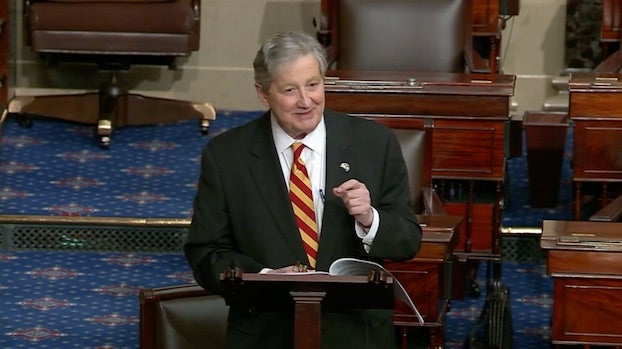Jindal tax plan includes rebates for poor, retired
Published 7:37 pm Friday, March 29, 2013
BATON ROUGE (AP) — Gov. Bobby Jindal’s tax package includes handing out rebate checks to the poor, active-duty military and certain retirees who otherwise could face hefty tax hikes under his restructuring proposal.
Those groups don’t pay income taxes, so Jindal’s bid to eliminate income taxes in exchange for higher and broadened sales taxes would hit them hardest without an offset.
Jindal touts the rebate programs, along with existing sales tax breaks on food and medication, as ensuring his tax swap proposal doesn’t disproportionately burden low- and moderate-income households.
“These provisions ensure retirees, low-income residents and families at all income levels will be better off,” the Republican governor said in a recent speech.
The state Department of Revenue estimated Friday that the rebates would cost $165 million for the first year of the tax swap that, if approved, would begin Jan. 1.
The rebates would grow annually, tied to the Consumer Price Index. The price tag for the programs has been growing, as the Jindal administration announced this week the governor would be pushing a larger sales tax hike than previously announced, to raise the state’s sales tax from 4 percent to 6.25 percent.
Lawmakers will consider the rebate programs as part of the governor’s tax package in the regular legislative session that begins April 8.
Jindal says his tax restructuring would boost economic development and job creation while also providing businesses and families with a more predictable tax bill.
Critics say the governor’s proposal would shift a greater share of state government operating costs onto the poor, middle class and small businesses, giving hefty tax breaks to the wealthy and big corporations.
Concerns have been raised that the rebate programs would require a new bureaucracy to administer. The nonpartisan Public Affairs Research Council of Louisiana questioned whether some people eligible for the rebates could fall through the cracks and how the state would monitor for fraud.
“Residency requirements and enforcement mechanisms will be necessary, along with government expense to maintain and police such a program. In all, the creation of a major new government entitlement program, along with its social and economic impacts and fiscal costs, must be evaluated carefully,” the council wrote in an analysis.
The rebates for low-income residents, the larger of the two programs, would pass through the system that provides welfare payments and food stamps in the state social services department. Benefits would be loaded onto debit cards.
Families would be eligible for rebates if they earn no more than $35,000 a year if married with children or $20,000 if single with children, under the Louisiana Family Assistance Rebate Program outlined to lawmakers.
The top annual rebate allowed would be $350 for a married couple earning no more than $15,000 and having five or more dependent children, revenue department spokesman Doug Baker said Friday.
Tim Barfield, Jindal’s leader on the tax revamp, estimated about 650,000 families would be eligible for the low-income program — more than the number of households that receive food stamps in the state.
Payments through the Assistance for Retiree and Military Rebate Program would be available to Louisiana residents who receive income from public retirement systems, Social Security and certain amounts of other retirement benefits, disability benefits and active-duty military pay.
After meeting the retiree or military pay criteria, the rebates would be offered to those with a federal adjusted gross income of $60,000 or less, or $120,000 or less for those married and filing taxes jointly, according to an outline given to lawmakers.
The maximum annual rebate allowed under the program could be $900 for a married couple with a $120,000 annual adjusted gross income, according to Baker, the revenue department spokesman.
No estimates have been provided of how many people would be eligible for the program, which would be administered by the Department of Revenue.
(American Press Archives)




